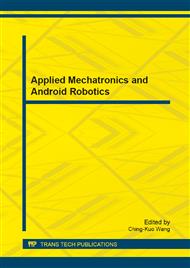p.34
p.38
p.44
p.48
p.52
p.59
p.63
p.70
p.74
The Study on the Emotion Factor Extraction from Korean SMS (Short Message Service) Text for Robot Service
Abstract:
This study is on the method of emotion extraction from Korean SMS text elements. There are errors and contradictions in the application of the results translated from foreign language, due to the difference of word origin to express the emotion. The extraction method was developed based on the characteristic of the Korean language, to minimize errors in emotion extraction. One of important characteristics of the Korean language is that emotion expressing words are mostly based on the changes in the body. The classification system developed is expected to be effective for robotic service.
Info:
Periodical:
Pages:
52-56
DOI:
Citation:
Online since:
September 2013
Authors:
Keywords:
Price:
Сopyright:
© 2013 Trans Tech Publications Ltd. All Rights Reserved
Share:
Citation:


